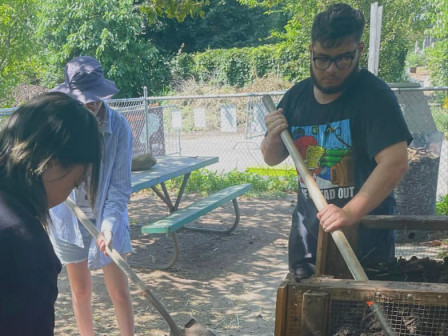Jakarta Intercultural School Student Researches How to Deal with Food Waste
Reported by Tiyo Surya Sakti | Translated by Nugroho Adibrata
The problem of food waste, which is still homework for the government, is attracting the attention of all groups. One of them is Shaffey Suhendra (18), a Class XII student from the Jakarta Intercultural School, Jalan Terogong Raya, Cilandak, South Jakarta.
Handling this problem must be comprehensive and involve the participation of all citizens
She did research, to find out how big the impact of food waste is on the environment.
According to her, food waste is still a problem because of the dense population. Based on the data in 2017, Indonesia was ranked second as the largest contributor to food waste in the world.
High School Student Researches Benefits of Consuming 'Jamu'The problem of food waste is widespread throughout Indonesia and affects environmental conditions in villages and cities.
"Therefore, handling this problem must be comprehensive and involve the participation of all citizens," she expressed, Sunday (11/26).
Based on data from The Harvard T.H. Chan School of Public Health, food waste includes discarded food at various stages in the production, storage, processing, distribution chain, and food that is intentionally discarded during the retail or consumption phase.
“The design and placement of trash cans can greatly influence people's behavior. The comparison example between Jakarta and New York City shows the importance of informative and easily accessible trash cans," she explained.
Some of the impacts of landfilling could be a disaster, such as in Leuwigajah, South Cimahi, West Java in 2005.
In these areas, waste accumulation seriously impacts the environment and society. The burning of waste that occurs in landfills and empty land, makes a significant contribution to air pollution and greenhouse gas emissions which have an impact on global warming.
"Food waste in rivers and oceans has also caused water pollution and harmed aquamarine life," she furthered.
She believed that the government could emulate the success of Singapore and South Korea in managing food waste. They implemented waste management with incineration (high-temperature waste processing), efficient waste sorting, fines against violators, and innovative approaches such as fees based on the weight of the waste.
"Seeing their success, the Indonesian government should adopt ways to overcome this problem in the future," she asserted.
By doing so, Indonesia can become a country that can reduce global food waste. It also requires public awareness and government support to create positive changes for a better future.
"The main aim of my research is to increase awareness of the Indonesian people about food waste and its impact on the environment," she said.

